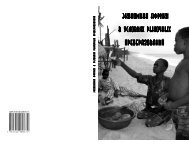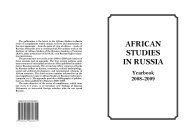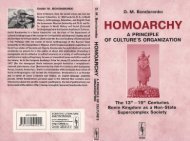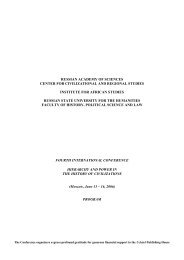L. Fituni, I. Abramova Resource Potential of Africa and Russia's ...
L. Fituni, I. Abramova Resource Potential of Africa and Russia's ...
L. Fituni, I. Abramova Resource Potential of Africa and Russia's ...
You also want an ePaper? Increase the reach of your titles
YUMPU automatically turns print PDFs into web optimized ePapers that Google loves.
a European–<strong>Africa</strong>n energy forum; there was an <strong>of</strong>ficial announcement<br />
in 2008 <strong>of</strong> the launching <strong>of</strong> <strong>Africa</strong>n – European energy partnership.<br />
22 This partnership calls, among other things, for coordination<br />
<strong>of</strong> strategies in the energy area <strong>and</strong> a considerable number <strong>of</strong><br />
cooperation projects where the Trans-Saharan Gas Pipeline (dubbed<br />
"the <strong>Africa</strong>n Nabucco") holds pride <strong>of</strong> place.<br />
As to non-energy raw materials, in 2008 the European Commission<br />
launched the "Raw Materials Initiative" (RMI) which established<br />
an integrated strategy to respond to the different challenges<br />
related to them as well as to non-agricultural raw materials.<br />
The RMI is based on three pillars describes in characteristic “eurospeak”<br />
as follows: “ensuring a level playing field in access to<br />
resources in third countries; fostering sustainable supply <strong>of</strong> raw<br />
materials from European sources, <strong>and</strong> boosting resource efficiency<br />
<strong>and</strong> promoting recycling. An element <strong>of</strong> the strategy is the need for<br />
a “raw materials diplomacy" anchored in wider policies towards<br />
third countries such as promoting human rights, good governance,<br />
conflict-resolution, non-proliferation <strong>and</strong> regional stability.” 23 In<br />
simpler terms, the concept envisages a policy <strong>of</strong> unhindered access<br />
to resources outside the EU external orders, preferential treatment<br />
<strong>of</strong> domestic EU suppliers as compared to external competitors, <strong>and</strong><br />
an elaborate use <strong>of</strong> political <strong>and</strong> ideological linkages <strong>and</strong> pressures<br />
in order to secure desirable terms <strong>and</strong> conditions <strong>of</strong> commodities’<br />
supplies to the EU.<br />
In June 2010, in Addis Ababa the European Commission agreed<br />
with the <strong>Africa</strong>n Union Commission (AUC) to establish bilateral cooperation<br />
on raw materials <strong>and</strong> development issues based on the<br />
RMI <strong>and</strong> the AUC's policy on mining <strong>and</strong> minerals, as expressed in<br />
the 2009 '<strong>Africa</strong>n Mining Vision'. It is expected that this cooperation<br />
will focus on three areas: governance, investment <strong>and</strong> geological<br />
knowledge/skills. Under the <strong>Africa</strong>-EU Joint Strategy 2011-<br />
2013, agreed at the <strong>Africa</strong>-EU Summit held in November 2010, actions<br />
on raw materials are foreseen under the Trade, Regional Economic<br />
Integration <strong>and</strong> Infrastructure Partnership. The EU <strong>and</strong> its<br />
Member States agreed to work jointly on these issues.<br />
The Commission proposed to:<br />
31







